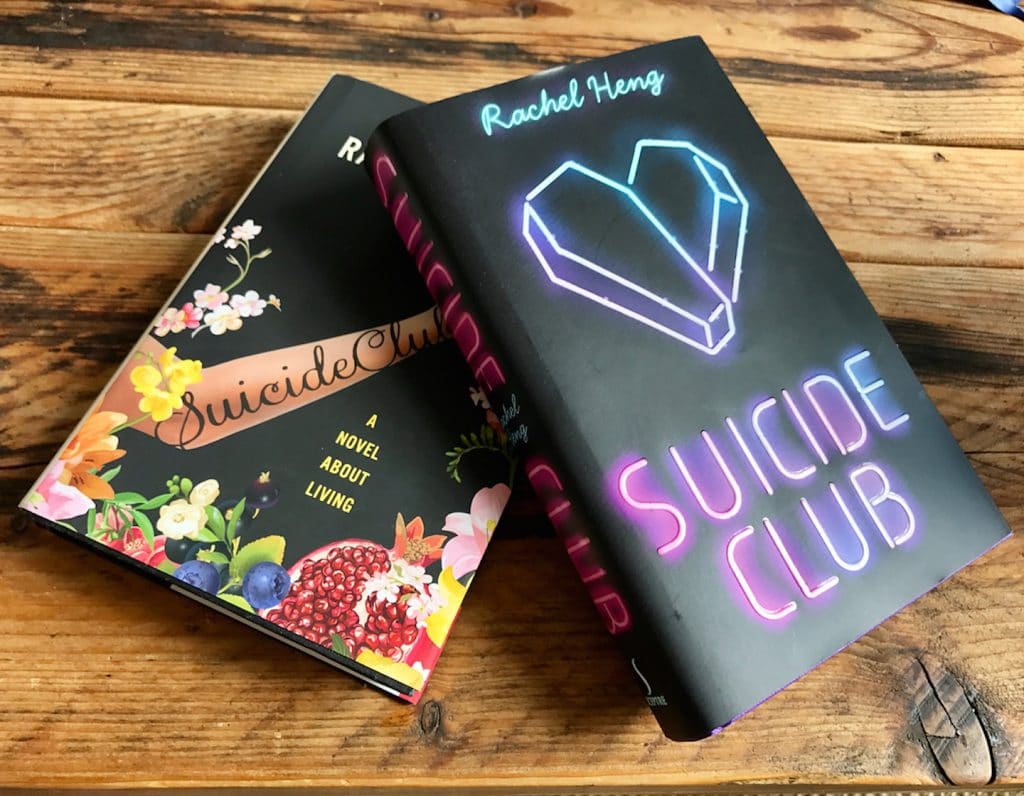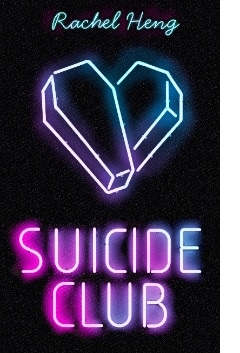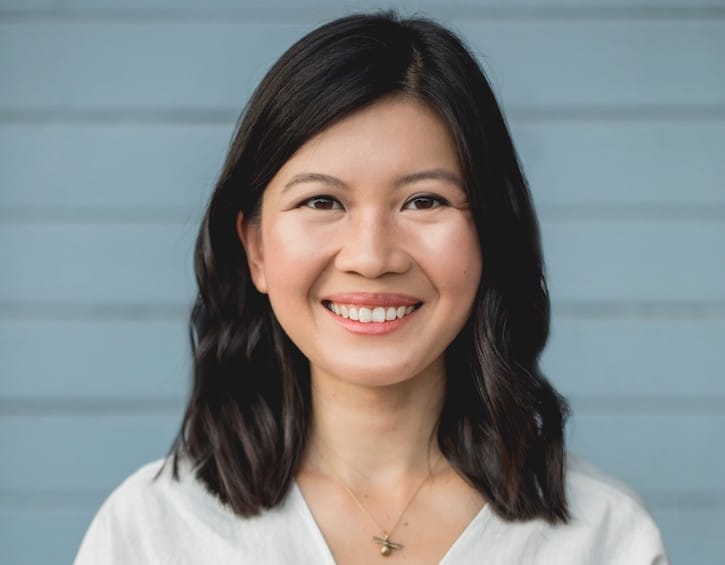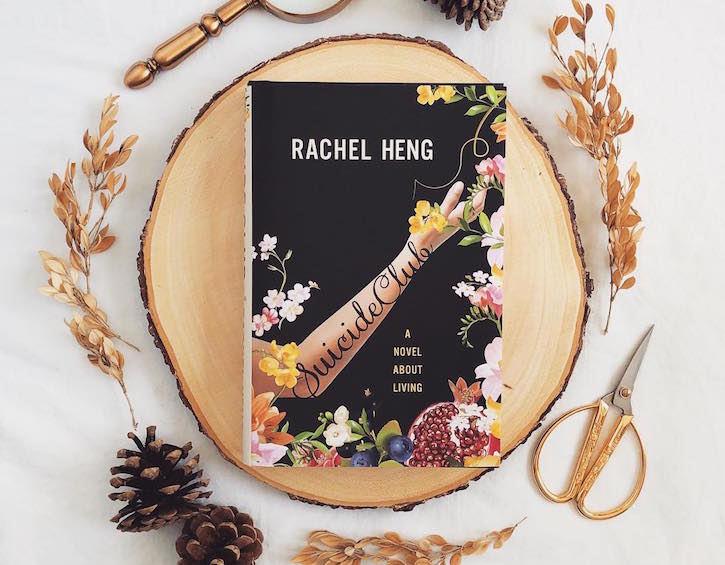
Singaporean Rachel Heng wrote one of the year’s most popular debut novels, and now she’s coming back home to Singapore. She talks to Lisa Beazley about making writing more than just a hobby.
If you haven’t heard of Rachel Heng yet, you will. The 30-year-old Singapore native’s debut novel The Suicide Club has been translated into ten languages and widely lauded by the media from The Atlantic and The Millions to Nylon and Bustle – and now Sassy Mama. She’s kind of a big deal.
 The Suicide Club is set in near future NYC where Lea Kirino is a Lifer, which means she gets to live forever — as long as she does everything right, from dutifully downing her green juices to getting plenty of rest and obviously never ever eating red meat or drinking wine or exercising too strenuously. But a chance encounter with her long estranged father pulls Lea into the mysterious world of the suicide club, a network of powerful individuals who decide to live – and die – on their own terms.
The Suicide Club is set in near future NYC where Lea Kirino is a Lifer, which means she gets to live forever — as long as she does everything right, from dutifully downing her green juices to getting plenty of rest and obviously never ever eating red meat or drinking wine or exercising too strenuously. But a chance encounter with her long estranged father pulls Lea into the mysterious world of the suicide club, a network of powerful individuals who decide to live – and die – on their own terms.
The premise may sound far-fetched, but in reading it I found myself easily able to imagine a world in which we become nostalgic for the aging process and all of the fun to be had spurring it on, if only incidentally.
We chatted with Rachel via email in advance of her upcoming return to Singapore for the Singapore Writers Festival.
Read More: 13 Great Novels by Singapore Authors
Rachel, reading your (fantastic) novel, I couldn’t help but wonder about your own relationship to “the wellness culture” and whether you are a reformed wellness junkie…
For most of my life I’ve been pretty unhealthy! I enjoy hawker food and am not a particularly enthusiastic vegetable eater. I’ve definitely tried in recent years to be more moderate in my tastes, but it’s a struggle…
You chose to set this book in the US – a future version of New York. Why is that? Did you think about setting in Singapore? Or was it too hard to imagine even a dystopian version of Singapore without its commitment to certain less- than-healthy foods?
I went to college in New York, and even then I was struck by the way the American healthcare system functioned and the deep inequality it fostered. As Suicide Club was about healthcare inequality in particular, it made sense to me that it would be set in New York. Now that you mention it though, it would be pretty difficult to imagine any version of Singapore where hawker food ceased being a staple!

You are based in Austin, TX, now. I’ve lived in Singapore for eight years and when I go home to Ohio, I have a list of restaurants I have to hit…What about you?
I definitely have the same. The list is very, very long! These are the ones I tend to visit most urgently: Tong Fatt Chicken Rice in Ghim Moh; XO Fish Soup at Dover; Hainanese Curry Rice at Telok Blangah hawker centre (I don’t remember the name, but there is always a line!), cheese prata at Casuarina Curry, Eng’s Wanton Mee in Siglap, BBQ chicken wings at Chomp Chomp… Oh, I’m hungry and sad now.
Any luck finding Singaporean food in Texas? What do you do when you are missing the tastes of home?
Unfortunately not. I rely on Prima paste to make chicken curry and sambal I bring from home to make sambal “kangkong” (usually spinach).
The Atlantic compared your book to Kazuo Ishiguro’s 2005 novel, Never Let Me Go, which takes on similar questions about the human cost of advances toward immortality. A. How cool was that? And B. Was Ishiguro’s work an inspiration? What other authors do you consider influential to your work?
It was the coolest! I had not actually read Never Let Me Go when I started writing Suicide Club in 2015. Midway through my first draft, a friend recommended that I read it, and I loved it right away. It was a bit of a spanner in the works though, as it was hard not to feel discouraged reading something that did what I wanted to do so well. I love so many authors, it’s hard to say who’s been influential, but I’d say for this particular book: Margaret Atwood, Aldous Huxley, Yoko Ogawa, David Mitchell, George Saunders, Kazuo Ishiguro.
Okay now as a reader, I have to ask: what are you reading and recommending to friends?
I have just finished Nana Kwame Adjei-Brenyah’s amazing dystopian short story collection Friday Black, and would highly recommend it. I also recently read Wu Ming-Yi’s The Man With The Compound Eyes and found it beautiful and moving.
Read more: Free Fun for Toddlers to Teens at SWF3 (Singapore Writers Festival for Families)

You didn’t start out as a writer, is that right? How did you decide to make the leap and what did you do? What would you say to people who think they might want to make a similar career change?
Books have always been my first love, but you’re right, I came to writing relatively late in life. I was working in finance, after having taken a government scholarship that sponsored my college education. I wrote fiction for a number of years while still working in the industry, getting up at 6am to write for an hour before work each day. I left my job because I got into the program at the Michener Center for Writers, which offered a 3-year fellowship to pursue a masters degree in creative writing, an opportunity that was too good to pass up. However, I definitely don’t think I would have left my job after selling my book if not for getting into the Michener program.
What I’d say to people who want to make a similar change is to think carefully before leaving their day jobs. Not only for financial stability – the reality being that most of us won’t be able to support ourselves from selling books alone – but also, I think there’s a lot of value in having a life outside writing. A job can bring people into your life and give you stories to write about, as well as keep you sane.
Finally….What are you working on now?
Ah, it’s still very, very early, but if it works out, it’ll be a semi-speculative historical novel.
Click here for deets on how to catch Rachel Heng in person at The Singapore Writers Festival!






 View All
View All





 View All
View All









 View All
View All




